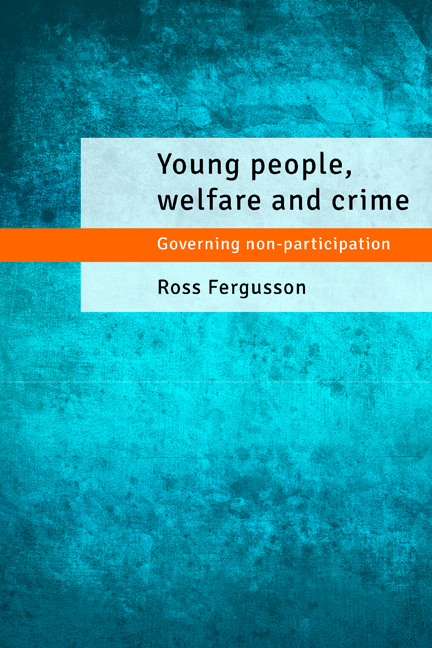Book contents
- Frontmatter
- Dedication
- Contents
- Detailed contents
- List of figures and tables
- List of abbreviations
- About the author
- Acknowledgements
- Part One The crisis of non-participation
- Part Two Work, welfare and crime: research and policy
- Part Three Theorising non-participation
- Part Four Criminalising non-participation
- References
- Copyright material
- Index
Five - Unemployment, crime and recession
Published online by Cambridge University Press: 01 September 2022
- Frontmatter
- Dedication
- Contents
- Detailed contents
- List of figures and tables
- List of abbreviations
- About the author
- Acknowledgements
- Part One The crisis of non-participation
- Part Two Work, welfare and crime: research and policy
- Part Three Theorising non-participation
- Part Four Criminalising non-participation
- References
- Copyright material
- Index
Summary
The group that appears to be at the highest risk of being negatively affected by changes in the economy (primarily of becoming or remaining unemployed during periods of recession) is the same one that appears to be at the highest risk of committing property and violent offences: socially disadvantaged young males in urban areas as well as persons who have a criminal record … This raises the possibility, already noted in the literature, that imprisonment is in effect being used as a method of segregating the surplus workforce – remarkably often aliens – from society. Although great variation was noted in this respect between countries, it was suggested that changes in the economy had an effect on the perception that practitioners in the criminal justice system had of the danger presented by offenders. Economic change may lead to changes in the cultural and ideological climate (as reflected for example in political rhetoric), which in turn affect the sentencing patterns.
European Committee on Crime Problems (1994) Crime and economy, Strasbourg: Council of Europe, p 164
Introduction
Since the two-year Great Depression of 1930‒31, recessions in the UK have been relatively infrequent and short-lived. Uniquely, the recession of 2008‒09 lasted for 18 months and was quickly followed by a second nine-month recession in 2011‒12, which took the so-called ‘double dip’ form, in which renewed recessionary conditions were followed by a brief recovery and an immediate return to recession. To date, there is no detailed analysis of the effects of the global financial crisis (GFC) with regard to the unemployment‒crime relationship among young people in the UK. However, the transformation of the economic landscape that followed provides a promising quasi-experimental basis for reviewing the claimed impact of unemployment on the incidence of crime in conditions of extreme financial duress for some households. There is also a reasonable expectation that established patterns of association and mooted causality between unemployment and crime will be more clearly manifested, and that the degree of welfare support available may be more clearly shown to be a significant factor in the relationship.
- Type
- Chapter
- Information
- Young People, Welfare and CrimeGoverning Non-Participation, pp. 119 - 136Publisher: Bristol University PressPrint publication year: 2016



